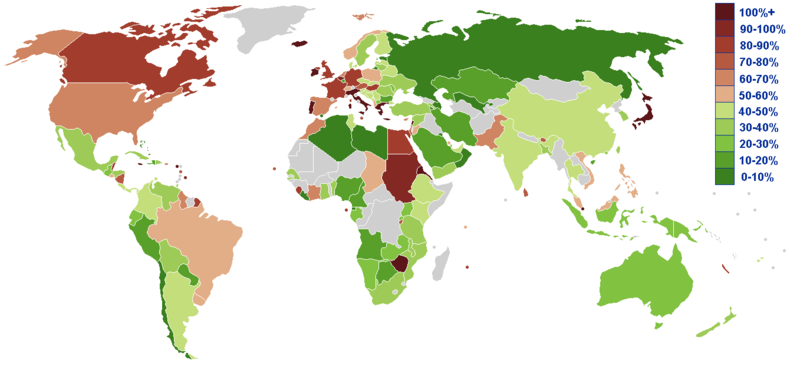The banking crisis is getting better and better.
Let's put things on a timeline here.
- Banks are lowering interest on loans and lowering the requirements for people to loan money.
- People borrow more and more money without being able to pay back.
- Banks sell those bad loans of, against higher speculation prices until someone figures out what they really are.
- Banks go bust.
- Governments bail out the banks.
- Now the EU says all countries that are over the 3% GDP eurozone limit will need to borrow from the banks. If not, austerity measures need to be taken. And this is where the protests begin...
Only because the national governments are not allowed to raise taxes because that would bring the EU's competition level in danger on the world markets.
Now hold on a second. Governments choose to bail out the banks, using taxpayers money. Banks are happy again and as a result taxpayers are now taken hostage by the EU for the bailout in the first place. Talking about being bent over and taken it in the arse twice!
So in response the EU Commission President said the following:
"Governments are not always right. If governments were always right we would not have the situation that we have today."
(source: http://www.telegraph.co.uk/news/worldnews/europe/spain/8032851/Europe-on-strike-over-austerity-measures.html)"Decisions taken by the most democratic institutions in the world are very often, or can be, wrong."
So that's why we needed a stronger EU with the Lisbon Treaty? EU has more to say undemocratically than the democratically chosen leaders of national parliaments.
I found this article that digs a little deeper into the source of this all.
Basically what the article says is that the IMF is planning all this. The problem is that the countries most steeped in public debt also have the largest voting power within the IMF:
 |
| (source: http://en.wikipedia.org/wiki/List_of_sovereign_states_by_public_debt) |
Funny thing is that most of these countries are not in public debt or have a far lower percentage of public debt against their GDP than the world average. Of course North Korea is not mentioned because it's not in the IMF and the known atrocities against their own people are known. That country must be in serious debt, despite what the leaders are saying.
By the looks of it, the western world (Europe and the US) are now ready to be swept up by IMF policies. Can't be too bad you say? We'll have to see about that...
Well they do want to help out, most of all because they see that countries are potting up and building up the reserves. Making it likely to pay off their debts all of the sudden! Like Russia did in 2005. This was a blow in the face of the IMF. About a $12 billion interest slap in the face for a period from 2005-2020. That was just interest on a $45 billion loan back in the '90ties...
Now, to see how beneficial this payback was...
Russia is doing quite well without debts from the IMF or other countries and is building a nice reserve system on top of that.
So that all needs a change. Welcome to reserve accumulation and a stable monetary system. The Bancor! A new global monetary unit.
(click for a larger picture)
They know it's going to have a lot of resistance. So the current demonstrations in Spain and Brussels are just a test balloon, seeing how much we resist. If we don't resist too much, they will push it a notch upwards.
Years ago I said the following, when there was a bit of a stir in NL about some measures. They where talking about going to The Hague to demonstrate.
Nowadays we rather sit behind our computer and protest, than go out on the streets. Maybe there will be riot police. And maybe they will use their batons. Before you know it, you have a bruise on your head, or worse, end up in the hospital. On Monday you can't come to work and have to explain to your boss what you where doing on Saturday. They will call it irresponsible and your own fault. Company medical policies will not pay out and you could loose your job, or be passed over a promotion. And most of us will not like that. So we stay put, behind our computer screens and protest in silence.The longer we keep doing this, the less resilience we will show. Until we're completely one world order with one political system and one monetary system. Because it seems that's what we wanted. Watch that IMF video again... It's not what we want.
Some go even further and predict a world war III And that is definitely not what we want. I know, it's a long read. Roadmaps are never short and snappy.






